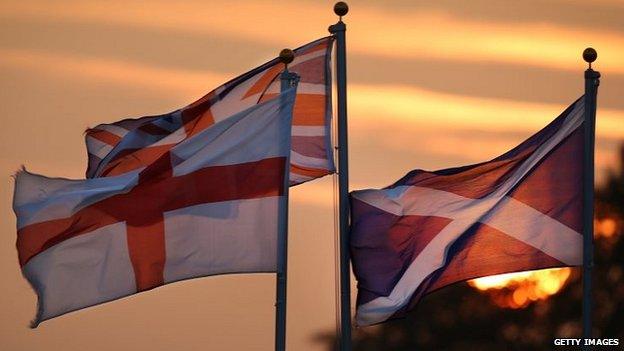The politics of the English Question
- Published

The Downing Street constitutional declaration - as it will become known - marks the start of what potentially could be massive constitutional change.
In particular, the prime minister has promised to give English MPs a greater say over legislation that affects England. He made clear this would cover the same issues over which Scotland will have greater control - tax, spending and welfare. And the changes will be agreed at the same pace with draft legislation by January.
But David Cameron did not spell out the detail, leaving a policy vacuum that will now be filled by Conservative MPs and an army of constitutional experts and think tanks. Everything from a full English parliament to complicated plans for English grand committees will be discussed.
The risk for the PM is that he loses control of this debate.
The politics of this, though, are clear. Mr Cameron has presented a huge challenge to Labour. Ed Miliband now faces the prospect of being forced to accept a diminution of power for Labour MPs in Scotland.
If he wins the next election, he could find it hard to get much of his programme through. The Labour leader may hope to move the debate on to other issues at his party conference next week. But it will be hard to shake off talk of what must now be called once again "the English question".
The other issue is the speed of this process. The prime minister has announced constitutional reform at a breakneck pace. And yet there is disagreement between the parties over the substantial detail. And who knows what all those constitutional experts in the House of Lords will do to oppose what many there see as rushed reform.
The danger for all the Westminster parties is that they have made a solemn vow to the people of Scotland to give greater powers to Holyrood. If they live up to that vow, then potentially this process could be a catalyst for massive constitutional change that helps to fix what many see as Britain's broken politics.
But if they fail to honour that vow because of disagreement over the English question, they risk the greatest breach of public trust that would tarnish Westminster's name forever.
- Published19 September 2014
- Published19 September 2014
- Published19 September 2014